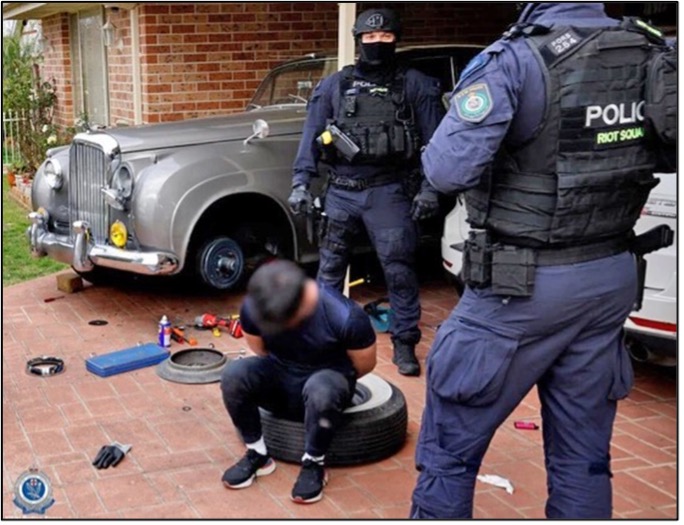Seafarer Criminalization Alive and Well
We have unfortunately become accustomed to the arrest of innocent seafarers when narcotics are found to have been planted on their vessels. The temptation to use shipping containers for illegal drug trafficking is obvious and while there are many successful interceptions, it’s impossible to quantify the ratio between success and failure.
In August this year, the level of deceptive ingenuity was taken to a new level when Australian border officers received a tip about a shipping container that had arrived in Port Botany (Sydney) from Canada. In the container was a 1960-era vintage Bentley with 162 kgs of methylamphetamine and 30 kgs of cocaine hidden behind the headlights. Police arrested three men and one woman, between the ages of 22 and 25, charging them with a total of 23 counts including drug offenses.
Sadly, there are also instances where misguided seafarers have been found to be actively involved in drug smuggling. A notable case involved the 11,600 TEU capacity MSC Gayane in 2019. Customs and Border Protection (CBP) boarded the ship in Philadelphia and found almost 20 tons of cocaine worth over $1 billion hidden in seven shipping containers. It was alleged that four crew members from Montenegro were at the heart of the operation having signed on the vessel with the intent to lead the operation. With the help of at least four other crew members, it was alleged that small craft met the vessel at night off South America on multiple occasions. “Crew members used the vessel’s crane to hoist cargo nets full of cocaine onto the vessel and then stashed the cocaine in the vessel’s shipping containers. After hiding cocaine among legitimate cargo, the crew members used fake seals to reseal the containers.”
Aside from reputational damage to the company, the U.S. government also targeted the MSC Gayane with a forfeiture action. To release the ship, MSC placed $10 million in a CBP security account and provided CBP with a $40 million surety bond. It agreed to disclose everything it knew about any criminal conduct of its employees related to the smuggling incident, facilitate any interviews with MSC employees by U.S. authorities, and assist with serving subpoenas on any MSC employees inside or outside the U.S.
The perils for seafarers when the rule of law is replaced by corruption are a continuing challenge for ship owners. Indonesia for example has long been known as a hot spot for piracy and all manner of extortion.
In July this year the Master of the tanker Nord Joy was arrested and sentenced to 15 days in jail along with a fine of $13,350 for allegedly illegally anchoring his vessel in Indonesian waters south of the Singapore Strait shipping lanes. A report carried by Reuters alleged that officers from the Indonesian Navy demanded $375,000 in cash to release the vessel. The report, which was a follow-up to a similar one in Lloyd’s List in November 2021, accused the officers of regularly seeking payments to release the vessels while threatening that the vessels could be detained for a long court process. In 2021, Reuters reported that a dozen similar incidents had taken place with tankers being held by the Indonesia Navy despite the indignant denials of the Navy’s top brass.
We have also become accustomed to governments enacting the principles of strict liability when it comes to maritime events such as oil pollution. Strict liability is not concerned with fault, whether on the part of the victim or on the part of the defendant whereas an accusation of negligence requires a determination of fault. In other words, a seafarer assumes guilt by merely being present at the scene of an incident. One assumes that this may be the case in the August 2022 ruling by a court in Dubai which issued a suspended jail sentence and a $28,000 fine to five crewmembers of the container feeder Ocean Trader, which suffered a cargo container explosion at Jebel Ali in June 2021.

Ocean Trader alongside following the blast – courtesy Dubai Ports.
The background to the incident was that three containers of hazardous cargo known as organic peroxide arrived in Jebel Ali from China and were stored in a terminal yard. More than a week later, and soon after being loaded on the vessel, one of the containers exploded, the blast being heard and visible over a wide area. Fortunately, only five people sustained minor injuries. Though the cargo had only just been loaded, charges were filed against the vessel’s Master and four crew members when court officials contended that the Master’s responsibility for stowing the containers made him liable, even though he played no role in the cargo’s open dock unprotected storage.
The Dubai Misdemeanour Court found that the container involved in the blast had been left in the sun on shore for 12 days, resulting in the decomposition and heating of the cargo inside, and found all five crew members guilty. Each was given a one-month suspended prison sentence and fined about $10,000. Five companies related to the ship and the shipment were each also fined $28,000.
It is strange that the IMO does not call out such examples of obvious seafarer criminalization. The stress for a Master and crew caught up in such events can be immeasurably life-changing and hardly helps to address the global shortage of qualified seafarers.

